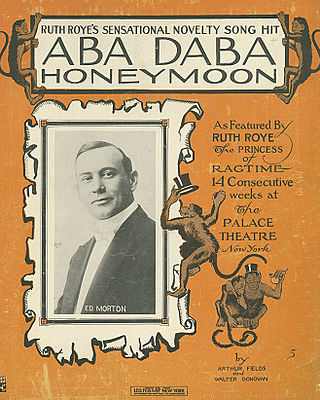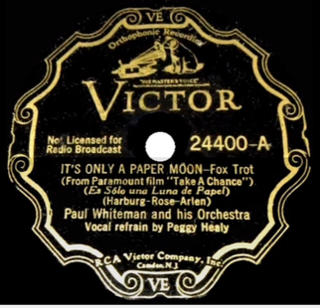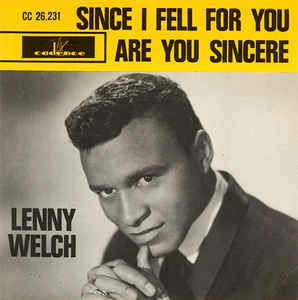Related Research Articles
"The Wonder of You" is a song written by Baker Knight. It was originally recorded by Vince Edwards in 1958, but this recording has never been released. In an interview with a DJ from Chattanooga, Tennessee, Ray Peterson told the story of how Baker Knight confided that "The Wonder of You" was originally written as a gospel song.
"If I Had You" is a 1928 song by "Irving King" with Ted Shapiro. Early hit versions in 1929 were by Rudy Vallée and Al Bowlly.

"(Get Your Kicks on) Route 66" is a popular rhythm and blues song, composed in 1946 by American songwriter Bobby Troup. The lyrics relate a westward roadtrip on U.S. Route 66, a highway which traversed the western two-thirds of the U.S. from Chicago, Illinois, to Los Angeles, California. The song became a standard, with several renditions appearing on the record charts.
"Alone (Why Must I Be Alone)" is a popular song written by Morty Craft with lyrics written by Craft's wife, Selma..
"Shangri-La" is a popular song written by bandleader Matty Malneck and Robert Maxwell in 1946 with lyrics by Carl Sigman.

"Aba Daba Honeymoon" is a popular song written and published by Arthur Fields and Walter Donovan in 1914, known through its chorus, "Aba daba daba daba daba daba dab, Said the chimpie to the monk; Baba daba daba daba daba daba dab, Said the monkey to the chimp," and first recorded in 1914 by the comic duo team of Collins & Harlan.
"It's De-Lovely" is one of Cole Porter's hit songs, originally appearing in his 1936 musical, Red Hot and Blue. It was introduced by Ethel Merman and Bob Hope. The song was later used in the musical Anything Goes, first appearing in the 1956 film version ; in the 1962 revival where it was sung by Hal Linden and Barbara Lang, and in the 2004 biographical film De-Lovely, where it was performed by Robbie Williams.
"You've Changed" is a popular song published in 1942 with music by Carl Fischer and words by Bill Carey. The melody features descending chromaticism. The song was first recorded on October 24, 1941 by Harry James & His Orchestra.

"It's Only a Paper Moon" is a popular song published in 1933 with music by Harold Arlen and lyrics by Yip Harburg and Billy Rose.
"Seems Like Old Times" is a popular song, with music and lyrics by Carmen Lombardo and John Jacob Loeb. The tune was derived from a 1939 song, "It Seems Like Old Times" with music and lyrics by Sam H. Stept and Charles Tobias, recorded by Freddy Martin, Ruby Newman and others.
"I Didn't Know What Time It Was" is a popular song composed by Richard Rodgers with lyrics by Lorenz Hart for the 1939 musical Too Many Girls. Introduced by Richard Kollmar and Marcy Westcott in the stage musical, early hit versions were recorded by Benny Goodman and by Jimmy Dorsey .
It was then performed by Trudy Erwin and Richard Carlson in the 1940 film adaptation produced by RKO. The song was later interpolated into the score of the 1957 film Pal Joey, sung by Frank Sinatra, and has become a jazz standard.
"Till Then" is a popular song written by Eddie Seiler, Sol Marcus, and Guy Wood and published in 1944.
"If I Loved You" is a show tune from the 1945 Rodgers and Hammerstein musical Carousel.

"Since I Fell for You" is a blues ballad composed by Buddy Johnson in 1945 that was first popularized by his sister, Ella Johnson, with Buddy Johnson and His Orchestra.
"The Song Is You" is a popular song and jazz standard composed by Jerome Kern with lyrics by Oscar Hammerstein II. It was written for their musical Music in the Air (1932) and sung in that show by Tullio Carminati. In the subsequent 1934 film, the song was recorded and filmed but cut from the final release. An instrumental of the song can still be heard under the opening credits.
"I Can't Get Started", also known as "I Can't Get Started with You" or "I Can't Get Started (With You)", is a popular song. It was written in 1936 by Vernon Duke (music) and Ira Gershwin (lyrics) and introduced that year in the revue Ziegfeld Follies of 1936, where it was performed by Bob Hope and Eve Arden.
"Honey" is a popular song written by Seymour Simons, Haven Gillespie and Richard A. Whiting. The song was a 1929 hit for Rudy Vallée & his Connecticut Yankees and another popular version was by Ben Selvin. It was also featured in the 1945 film Her Highness and the Bellboy.
"Where Are You?" is a popular song composed by Jimmy McHugh, with lyrics by Harold Adamson. The song was written for the 1937 film Top of the Town and was originally performed by Gertrude Niesen. Niesen also made a commercial recording of the song for Brunswick Records and this was popular.
"All of My Life" is a 1944 song composed by Irving Berlin. It was first recorded in 1945 by Bing Crosby whose version reached No. 12 in the Billboard charts. Other chart hits in 1945 were by Sammy Kaye and his Orchestra and by The Three Suns.
"Just as Though You Were Here" is a song written by John Benson Brooks (music) and Eddie DeLange (lyrics). The first recording was made by Tommy Dorsey and His Orchestra on May 18, 1942 with vocals by Frank Sinatra and The Pied Pipers. It reached the Billboard charts in July 1942, peaking at No. 6 during a ten-week stay. Sinatra recorded the song again on September 24, 1974 for Reprise.
References
- ↑ The Real Book Vol. 6. Hal Leonard. 2017. p. 218. ISBN 1495090167.
- ↑ "secondhandsongs.com". secondhandsongs.com. Retrieved July 7, 2020.
- ↑ "JazzStandards.com".
- ↑ Whitburn, Joel (1986). Joel Whitburn's Pop Memories 1890-1954. Menomonee Falls, Wisconsin: Record Research Inc. p. 533. ISBN 0-89820-083-0.
- ↑ "secondhandsongs.com". secondhandsongs.com. Retrieved July 7, 2020.